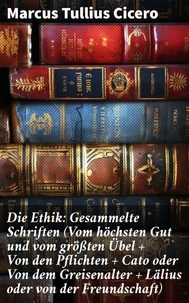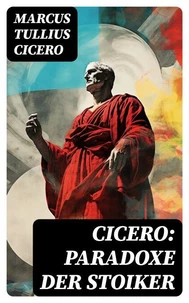Cicero's Tusculan Disputations. Also, Treatises On The Nature Of The Gods, And On The Commonwealth
Par : ,Formats :
Disponible dans votre compte client Decitre ou Furet du Nord dès validation de votre commande. Le format ePub est :
- Compatible avec une lecture sur My Vivlio (smartphone, tablette, ordinateur)
- Compatible avec une lecture sur liseuses Vivlio
- Pour les liseuses autres que Vivlio, vous devez utiliser le logiciel Adobe Digital Edition. Non compatible avec la lecture sur les liseuses Kindle, Remarkable et Sony
 , qui est-ce ?
, qui est-ce ?Notre partenaire de plateforme de lecture numérique où vous retrouverez l'ensemble de vos ebooks gratuitement
Pour en savoir plus sur nos ebooks, consultez notre aide en ligne ici
- Nombre de pages448
- FormatePub
- ISBN859-65--4702608-2
- EAN8596547026082
- Date de parution28/05/2022
- Protection num.Digital Watermarking
- Taille703 Ko
- Infos supplémentairesepub
- ÉditeurDIGICAT
Résumé
Cicero's *Tusculan Disputations* is a profound philosophical dialogue that explores the nature of happiness and the human condition through a series of discussions between the author and his interlocutors. Written in a direct and engaging style, the text weaves together Stoic principles and Platonic ideals, allowing Cicero to delve into the complexities of morality, death, and the pursuit of the good life.
Set against the backdrop of late Roman Republic turmoil, this work stands as a testament to the intellectual discourse of the time, emphasizing both the personal and civic dimensions of philosophy. Marcus Tullius Cicero, a statesman, orator, and philosopher of the first century BCE, was deeply influenced by the political and social upheaval of his era. His experiences in public life, coupled with his belief in the importance of philosophy as a means for ethical living and civic responsibility, shaped the themes in *Tusculan Disputations*.
Cicero sought to make philosophy accessible to a wide audience, framing his inquiries through the lens of Roman cultural values and the urgent quest for stability amidst chaos. *Tusculan Disputations* is highly recommended for readers interested in classical philosophy, ethics, and the historical context of Roman thought. Cicero's eloquence and mastery in presenting complex ideas make this work not only intellectually enriching but also profoundly relatable to contemporary struggles with morality and existential inquiry.
Set against the backdrop of late Roman Republic turmoil, this work stands as a testament to the intellectual discourse of the time, emphasizing both the personal and civic dimensions of philosophy. Marcus Tullius Cicero, a statesman, orator, and philosopher of the first century BCE, was deeply influenced by the political and social upheaval of his era. His experiences in public life, coupled with his belief in the importance of philosophy as a means for ethical living and civic responsibility, shaped the themes in *Tusculan Disputations*.
Cicero sought to make philosophy accessible to a wide audience, framing his inquiries through the lens of Roman cultural values and the urgent quest for stability amidst chaos. *Tusculan Disputations* is highly recommended for readers interested in classical philosophy, ethics, and the historical context of Roman thought. Cicero's eloquence and mastery in presenting complex ideas make this work not only intellectually enriching but also profoundly relatable to contemporary struggles with morality and existential inquiry.
Cicero's *Tusculan Disputations* is a profound philosophical dialogue that explores the nature of happiness and the human condition through a series of discussions between the author and his interlocutors. Written in a direct and engaging style, the text weaves together Stoic principles and Platonic ideals, allowing Cicero to delve into the complexities of morality, death, and the pursuit of the good life.
Set against the backdrop of late Roman Republic turmoil, this work stands as a testament to the intellectual discourse of the time, emphasizing both the personal and civic dimensions of philosophy. Marcus Tullius Cicero, a statesman, orator, and philosopher of the first century BCE, was deeply influenced by the political and social upheaval of his era. His experiences in public life, coupled with his belief in the importance of philosophy as a means for ethical living and civic responsibility, shaped the themes in *Tusculan Disputations*.
Cicero sought to make philosophy accessible to a wide audience, framing his inquiries through the lens of Roman cultural values and the urgent quest for stability amidst chaos. *Tusculan Disputations* is highly recommended for readers interested in classical philosophy, ethics, and the historical context of Roman thought. Cicero's eloquence and mastery in presenting complex ideas make this work not only intellectually enriching but also profoundly relatable to contemporary struggles with morality and existential inquiry.
Set against the backdrop of late Roman Republic turmoil, this work stands as a testament to the intellectual discourse of the time, emphasizing both the personal and civic dimensions of philosophy. Marcus Tullius Cicero, a statesman, orator, and philosopher of the first century BCE, was deeply influenced by the political and social upheaval of his era. His experiences in public life, coupled with his belief in the importance of philosophy as a means for ethical living and civic responsibility, shaped the themes in *Tusculan Disputations*.
Cicero sought to make philosophy accessible to a wide audience, framing his inquiries through the lens of Roman cultural values and the urgent quest for stability amidst chaos. *Tusculan Disputations* is highly recommended for readers interested in classical philosophy, ethics, and the historical context of Roman thought. Cicero's eloquence and mastery in presenting complex ideas make this work not only intellectually enriching but also profoundly relatable to contemporary struggles with morality and existential inquiry.






